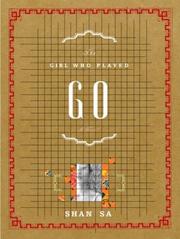
The Girl Who Played Go
by Shan Sahistorical fiction east asian history war
Reviewed on: 13th February 2025.
If you know anything about me, you know I love Go. And if you know anything about Go, you might correctly guess that there aren’t many (western) novels where it plays a role. This is enough to pique my interest and pick this book up. Unfortunately, Go turns out to be a very minor plot element, so I wouldn’t necessarily recommend this book to any Go player who aren’t also interested in historical drama. Still, I don’t regret reading this book; it’s quite memorable.
Narrative
“The Girl Who Played Go” is a lightly written novel with a heavy, harrowing plot. The narrative follows the intertwining stories of unnamed protagonists—I’ll call them the Girl and the Stranger—until their paths collapse as one. Chapters are short, often spanning only few pages. Each chapter alternates point-of-view, offering a short peek into their lives. This structure makes for a light reading experience, despite the heavy plot.
Plot
The plot takes place during the 1930s Japanese occupation of Manchuria. In the early chapters, some exposition is provided for this time and place, enough to give an idea of the relevant historical context. The Girl is a manchurian student from a relatively well-off family. Early on, her main concerns are the tribulations of growing into adulthood.
Years have passed and now I am an anxiously watching the twilight of my childhood, quietly sinking, never to rise again. [...] [Cousin] doesn't understand. He wants me to join him in the adult world, but he doesn't realise that I think it is a sad place full of vanity, and it frightens me. — Girl
The Stranger is a japanese soldier concerned with little more than national honor and sacrifice.
Only the vocabulary of death is allowed between [mother and I]. She writes, "Do not hesitate to die to honour the Emperor. It is the path of your fate." And I reply, "What joy to sacrifice myself for my beloved country." I will not tell her that I shall also die for her glory, and she will never admit that my death will destroy her. — Stranger
The Stranger is on assignment in Manchuria to suppress rebel forces, and through his eyes we see the gruesome reality of war in many forms. Personally, I found his narrative arch to be more interesting than the Girl’s; every few chapters I would feel my opinions of him pulled in all directions. Is he a good, thoughtful man? Is he wicked? Is he an invader in a foreign land? Is he himself a victim of his time and place? Well, to all, yes.
Far from being a particularly explicit account of violence, one moment feels particularly memorable, as he reports to his captain on the “interrogation” (read: “torture”) of captured rebels.
Seeing these men dying in agony makes my skin crawl with goose pimples, but the Lieutenant's serene and attentive expression forces me to hide my disgust. [...] Back in my room, I write my report for Captain Nakamura, and in it I praise Lieutenant Oka: "He is a meticulous man who is devoted to the Emperor. He must be left to act as he sees fit and with the complete co-operation of his assistants. An outsider would disrupt the precision of his work and would interfere with the smooth running of the interrogations. "I myself would ask you not to send me there again, Captain. My visit there fortified my conviction that we must never allow ourselves to be taken alive by the enemy." — Stranger
The Stranger witnesses the darkest depth of human horror, even coming from his own side of the conflict. He understands it, and he is not unaffected by what he sees. But it does not fundamentally change him. This is a person who does even begin to question whether he has a choice to make.
Go and Cultural Divides
In relation to Go, one can see how the two clashing cultures seep into their playstyle, in ways that remains accurate to this very day, with chinese Go being very direct and aggressive, whereas japanese Go is more focused on elegance and form.
The Stranger's play is infinitely slow. I am surprised by his convoluted deliberations: each of his moves translates a desire for harmony within the whole. His stones make a subtle, airborne sort of progress like the dance of the cranes. I didn't know that there was a school in Peking where elegance had the edge over violence. — Girl
She puts the stones away in their pot, clattering them against each other, a racket that is clearly a protest against my indifference. I laugh inwardly: she would be a great player if she could moderate her aggression and apply herself to a more spiritual path. — Stranger